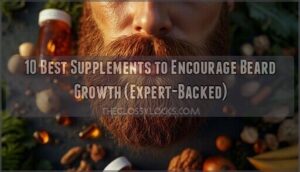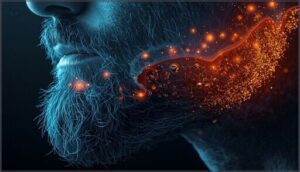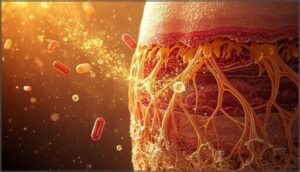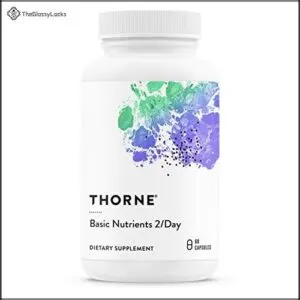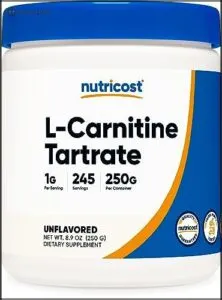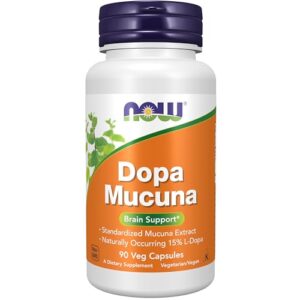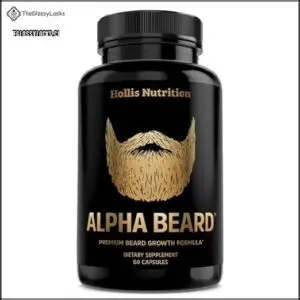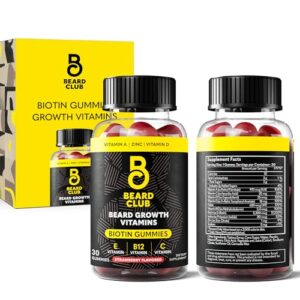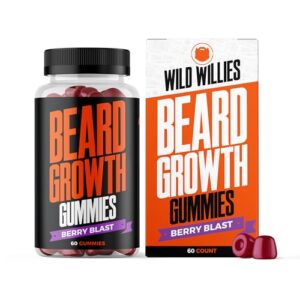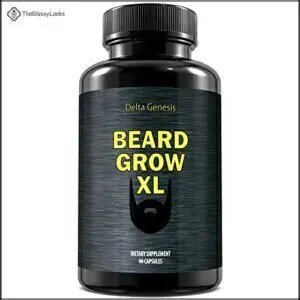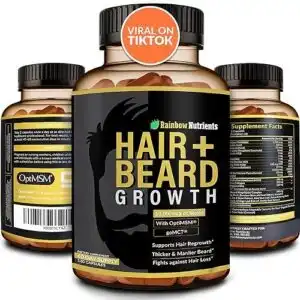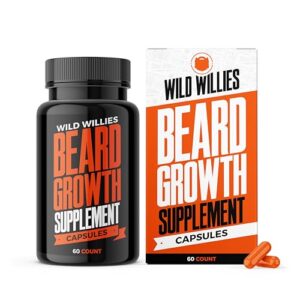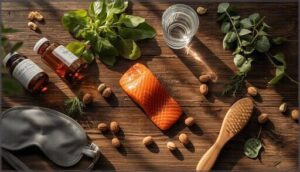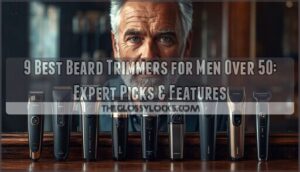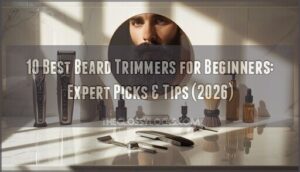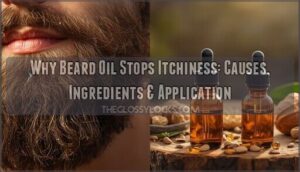This site is supported by our readers. We may earn a commission, at no cost to you, if you purchase through links.
Your friend swears his patchy beard filled in after three months on supplements. Your barber insists biotin made all the difference. But most guys waste money on products that do nothing—or worse, throw their hormones out of whack.
The truth is that supplements to encourage beard growth only work when they target the actual biological factors behind facial hair: testosterone conversion, androgen receptor sensitivity, and follicle nutrition. Genetics still run the show, but the right combination of vitamins, minerals, and amino acids can push your follicles closer to their maximum potential.
The challenge is separating legitimate options from the snake oil flooding the market.
Table Of Contents
- Key Takeaways
- Key Factors That Influence Beard Growth
- How Supplements Promote Beard Growth
- Top 10 Supplements for Beard Growth
- 1. Thorne Basic Nutrients Daily Multivitamin
- 2. Nutricost L-Carnitine Tartrate Powder Unflavored
- 3. NOW DOPA Mucuna L-Dopa Capsules
- 4. Alpha Beard Growth Vitamin Supplement
- 5. Beard Club Biotin Beard Growth Vitamins
- 6. Beard Club Biotin Growth Gummies
- 7. Wild Willies Beard Growth Gummies
- 8. Beard Grow XL Vegan Supplement
- 9. Hair and Beard Growth Vitamins Men
- 10. Wild Willies Beard Growth Vitamins
- Choosing Effective and Safe Beard Supplements
- Nutrition and Lifestyle Tips for Healthy Beard Growth
- Frequently Asked Questions (FAQs)
- Conclusion
Key Takeaways
- Most beard supplements only work if you’re deficient in specific nutrients or have low testosterone—they can’t override your genetic follicle count or create new hair where none exists.
- The real drivers of beard growth are DHT conversion (not just testosterone), androgen receptor sensitivity, and follicle nutrition, which means supplements targeting these pathways matter more than generic biotin megadoses.
- High-dose biotin (5,000-10,000 mcg) can interfere with lab tests for thyroid and cardiac markers, potentially causing dangerous misdiagnoses, while saw palmetto actually blocks DHT and works against beard growth.
- You’ll need 4-6 weeks minimum to see any changes and 2-6 months for full results, but only if you fix the underlying deficiency—most guys waste money on products that don’t address their actual limiting factor.
Key Factors That Influence Beard Growth
Your beard doesn’t grow in a vacuum. It reacts to a complex mix of genetic programming, hormone levels, and how your body actually uses those hormones.
Let’s break down the four main factors that determine whether you end up with a full beard or patchy stubble.
Genetics and Follicle Density
Regarding facial hair, your genetic predisposition calls the shots. You’re born with somewhere between 6,000 and 25,000 hair follicles in your beard region—that follicle count is fixed from day one. The genetic factors greatly influence beard growth patterns.
Here’s what matters most:
- Androgen receptors in each hair follicle determine sensitivity to growth hormones
- Beard density varies from 20 to 120 hairs per square centimeter
- Ethnic variations affect texture and growth patterns, not actual follicle health
Hormonal Balance—Testosterone and DHT
Testosterone production sets the stage, but DHT conversion drives the real show. Your body transforms testosterone into DHT through 5-alpha reductase, and research shows that linear beard growth correlates directly with DHT levels—not just testosterone.
Testosterone sets the stage, but DHT conversion—not testosterone alone—actually drives beard growth
Men with normal testosterone but low DHT often struggle with patchy beards. Hormone therapy studies confirm this: restoring androgens to normal ranges consistently improves facial hair density and growth rate. In these cases, testosterone replacement therapy may be considered.
Androgen Receptor Sensitivity
High DHT alone won’t grow your beard if your androgen receptors don’t respond. Receptor sensitivity varies by genetics and location—facial follicles show higher AR density than scalp regions, which explains the androgen paradox. Studies reveal that topical DHT at specific concentrations boosts follicle activity, while minoxidil effects work partly by reducing excessive AR expression.
- Your genetic predisposition determines baseline receptor responsiveness
- DHT conversion means nothing without functional androgen receptors
- Topical treatments can modulate receptor density and sensitivity
- Androgenic hormones need receptors to trigger beard growth
Age, Maturation, and Lifestyle Habits
Beyond receptor biology, your beard follows a maturation timeline tied to beard age factors. Most men peak between 25 and 30, when hormonal changes stabilize and follicles fully mature.
Lifestyle influence matters—exercise boosts testosterone, while smoking and poor sleep quality stunt growth. Stress management, nutrition impact, and a healthy lifestyle for beard growth aren’t optional.
Lifestyle modifications drive real results once your genetics allow it.
How Supplements Promote Beard Growth
Supplements work through four main pathways to give your beard the hormonal and nutritional support it needs. Some increase testosterone and DHT production, while others make your follicles more responsive to these hormones or simply fill the gaps in your diet.
Here’s how each mechanism actually influences what happens beneath your skin.
Boosting Testosterone and DHT Levels
Your body’s hormone factory—specifically testosterone and DHT production—sets the foundation for facial hair growth. Supplements targeting this pathway can make a difference when baseline levels need support.
- Zinc supplementation corrects deficiency and raises testosterone 8–20% in studies, supporting Leydig cell function
- D-aspartic acid shows inconsistent results; benefits appear limited to men with low-normal baseline testosterone
- Saw palmetto actually inhibits DHT metabolism and blocks androgen receptors—avoid it for beard goals
- Androgen resistance can prevent benefits even when male hormone production increases
Enhancing Androgen Receptor Activity
Even when androgens flood your bloodstream, your beard won’t grow if receptors can’t respond. AR gene polymorphisms determine baseline sensitivity, while supplements like boron lower SHBG and boost free testosterone.
Dermal papilla cells rely on androgen receptor activation to trigger Wnt/β-catenin signaling—the pathway that actually wakes up dormant follicles.
Topical androgen therapies bypass systemic resistance when receptors won’t cooperate.
Filling Nutritional Gaps for Follicle Health
Without adequate protein intake and micronutrients, your follicles can’t build strong keratin shafts. Vitamin deficiencies—especially folate, B12, and niacin—disrupt cellular turnover and microcirculation, pushing hairs into telogen shedding.
Amino acids like cysteine and methionine fuel keratin synthesis directly. Mineral support from zinc and iron corrects nutritional deficiencies that weaken beard density.
Filling nutritional gaps restores the anagen phase and improves nutrient delivery to starved follicles.
Reducing Inflammation and Supporting Circulation
Systemic inflammation and poor blood circulation choke off the oxygen and nutrients your follicles need to stay in active growth. Chronic stress, smoking, and high cortisol levels wreck microcirculation support and trigger telogen shedding.
- Omega-3 fatty acids lower TNF-α and reduce inflammatory cytokines that disrupt the anagen phase
- L-citrulline boosts nitric oxide bioavailability, dilating small vessels that feed follicles
- Polyphenol benefits from green tea and curcumin improve flow-mediated dilation and endothelial function
- Lifestyle factors like sleep and stress management work synergistically with antioxidants and micronutrients to restore perifollicular perfusion
Top 10 Supplements for Beard Growth
You’ve seen how supplements work—now let’s talk about which ones actually deliver. Not all beard products live up to their promises, and some are flat-out junk with fake reviews and exaggerated claims.
Below are ten supplements ranked by evidence and quality, from research-backed options to popular products you’ll find online.
1. Thorne Basic Nutrients Daily Multivitamin
Thorne Basic Nutrients 2/Day delivers micronutrient optimization through two capsules daily, supplying 500 mcg biotin and 50 mcg vitamin D3 alongside zinc and selenium at levels shown to support hair follicle function.
Nutrient absorption is high because the formula uses active vitamin forms, though capsule size and smell/taste bother some users.
Clinical use at Mayo Clinic and NSF Certified for Sport status signal quality, but don’t expect direct beard transformation. This multivitamin fills gaps—it won’t override poor androgen receptor genetics.
The dosing schedule is simple: take with food.
Best For: Adults with dietary gaps who want a research-backed multivitamin that supports hair follicle health through biotin, zinc, and vitamin D, and who don’t mind swallowing large capsules.
- High-dose biotin (500 mcg), zinc (15 mg), and selenium (200 mcg) at levels used in hair health studies, plus active vitamin forms for better absorption
- NSF Certified for Sport and used at Mayo Clinic, signaling third-party testing and clinical-grade quality standards
- Gluten, dairy, and soy-free formula with simple twice-daily dosing that fits most supplement routines
- Large capsule size with unpleasant smell and taste reported by multiple users, making daily use difficult for some
- Higher price point compared to basic multivitamins, which may not justify the cost if you’re only looking for beard support
- Stomach issues like nausea and heartburn affect some users, especially when not taken with food
2. Nutricost L-Carnitine Tartrate Powder Unflavored
Nutricost L-Carnitine Tartrate Powder Unflavored provides 1 gram per scoop—half the dose used in clinical evidence showing increased androgen receptors in muscle tissue. You’d need two servings daily to match the 2-gram protocol that raised receptor density in resistance-trained men.
The link to beard growth supplements? Indirect. Better androgen receptors mean your testosterone and DHT work more efficiently, but no studies tested L-carnitine L-tartrate on facial hair directly.
Exercise recovery benefits are real—reduced soreness, improved circulation—which aids the lifestyle habits beard growth demands. Safety profile is solid at typical dosages.
Best For: Men who want to optimize their testosterone receptor sensitivity and improve exercise recovery as part of a comprehensive approach to beard growth, rather than expecting direct hair follicle effects.
- Clinically studied dose of 2 grams per day showed increased androgen receptor density in muscle tissue, potentially making existing testosterone work more efficiently throughout the body.
- High-quality unflavored powder format allows flexible dosing and easy mixing with other supplements, plus third-party testing confirms purity and content.
- Proven exercise recovery benefits including reduced muscle soreness and improved circulation may support the consistent training that enhances overall hormonal health.
- No direct clinical evidence linking L-carnitine tartrate supplementation to facial hair growth specifically, so beard benefits remain theoretical and indirect.
- Requires two servings daily (2 grams total) to match research doses, doubling the suggested serving size and accelerating how quickly you’ll go through each container.
- Some users experience mild gastrointestinal discomfort, and effects on androgen receptors may take several weeks of consistent use before any downstream benefits appear.
3. NOW DOPA Mucuna L-Dopa Capsules
NOW DOPA Mucuna L-Dopa Capsules deliver 15% L-dopa, which feeds dopamine production and may nudge testosterone higher through the pituitary axis. The hormonal effects look promising—Mucuna pruriens has shown endocrine recovery in clinical work—but direct beard growth evidence doesn’t exist.
User experiences mention thicker hair and improved libido, yet results vary wildly. Dosage recommendations start at one capsule daily, scaling to six maximum. Side effects include anxiety and nausea in some users.
Taking it with high-protein meals or vitamin B6 tanks absorption, limiting effectiveness.
Best For: Men looking for a natural dopamine boost that might indirectly support testosterone and beard growth, though clinical proof for facial hair is lacking.
- Contains standardized 15% L-dopa that supports dopamine production and may influence testosterone through hormonal pathways
- Users report thicker hair, improved mood, and enhanced libido with proper cycling
- Vegan, non-GMO, and GMP-certified with clear dosage flexibility from one to six capsules daily
- Direct evidence for beard growth is entirely anecdotal with no clinical studies confirming effectiveness
- Requires careful timing away from protein and vitamin B6 to maintain absorption
- Can cause anxiety, nausea, and requires cycling off to avoid dopamine-related crashes
4. Alpha Beard Growth Vitamin Supplement
Alpha Beard packs 10,000 mcg of biotin alongside collagen, MSM, and zinc—a typical beard growth vitamins cocktail. The formula mimics general hair supplement ingredients, but here’s the problem: no trial tests this exact blend on beards.
Alpha Beard ingredients like OptiMSM show promise for hair shaft strength in small studies, yet efficacy evidence for facial hair remains absent. Consumer reviews split between raves and crickets.
Safety concerns? High-dose biotin skews lab tests, including thyroid panels. Market position leans mid-tier, competing on brand name rather than proven results.
Best For: Men with existing facial hair looking to reduce breakage and improve beard thickness, who are comfortable taking high-dose biotin despite limited beard-specific evidence.
- Contains a comprehensive blend of hair-supporting nutrients including 10,000 mcg biotin, collagen, MSM, and zinc in a single daily capsule
- Uses branded OptiMSM ingredient that has shown promise for hair shaft strength in small clinical studies
- Made in USA at a GMP-certified facility, offering quality assurance and gluten-free formulation
- No clinical trials testing this specific formula on beard growth or density outcomes
- High biotin dose (10,000 mcg) can interfere with lab tests for thyroid and cardiac markers, potentially causing misleading medical results
- Won’t create new hair follicles in patchy areas—only supports health of existing facial hair, with results taking up to 3 months if they appear at all
5. Beard Club Biotin Beard Growth Vitamins
Beard Club biotin beard growth vitamins deliver 5,000 mcg of biotin plus a multivitamin complex—standard fare in the beard supplements space. User testimonials range from “patches filled in after eight weeks” to “zero change,” reflecting marketing claims that outpace actual biotin efficacy data.
Product limitations include no beard-specific trials and dosage concerns around lab test interference. If paired with the brand’s derma roller and topical lineup, you might see modest gains over months, but the vitamins alone won’t overcome weak androgen receptors or sparse follicle density.
Best For: Men looking for a convenient daily supplement to support beard growth alongside other grooming products, especially if they have mild nutritional gaps or patchy areas they want to address over several months.
- Includes 5,000 mcg of biotin plus a full spectrum of vitamins and minerals (A, B-complex, C, D, E, zinc, copper) that support overall hair health and follicle function.
- Designed to stack with The Beard Club’s topical products and derma roller for a multi-pronged beard growth regimen, with some users reporting visible improvements in patch density after 4–12 weeks.
- Easy two-capsule daily routine with generally good tolerability and no serious adverse effects reported in most users.
- No controlled clinical trials specifically demonstrate biotin’s effectiveness for beard growth in healthy, non-deficient men, so results vary widely and may be largely placebo-driven.
- High biotin doses can interfere with common lab tests (thyroid panels, cardiac markers), requiring disclosure to healthcare providers and discontinuation before testing.
- Some users found the product expensive for modest results, and feedback indicates it may not work well for all beard types or overcome genetic limitations in follicle density.
6. Beard Club Biotin Growth Gummies
The gummy format swaps pills for a strawberry-flavored delivery—same 5,000 mcg biotin, same vitamin cocktail, same limitations. Beard growth supplements in gummy form trend upward in market popularity, yet the nutritional value doesn’t change when you chew instead of swallow.
User experiences mirror the capsule version: some report modest thickness gains, others nothing. Potential side-effects include breakouts and nausea from high vitamin doses.
Beard supplement ingredients like MSM and horsetail extract lack rigorous beard-specific trials. Convenience doesn’t override weak follicle genetics or low androgen receptor density.
Best For: Men who prefer a convenient, flavored supplement option and want to support beard growth with biotin and vitamins, though results vary significantly by individual genetics.
- Strawberry-flavored gummies offer an easier, more enjoyable alternative to swallowing pills or capsules
- Contains 5,000 mcg biotin plus a comprehensive blend of vitamins (A, B complex, C, D, E) and minerals like zinc and copper
- Dairy-free, gluten-free, and wheat-free formulation accommodates various dietary restrictions
- Effectiveness for beard growth is inconsistent, with many users reporting no noticeable improvement in thickness or density
- High vitamin doses can trigger side effects including acne breakouts, nausea, and digestive issues in some users
- Key ingredients like MSM and horsetail extract lack solid clinical evidence specifically supporting beard growth
7. Wild Willies Beard Growth Gummies
Another berry-blast option, Wild Willies Beard Growth Gummies, deliver 5,000 mcg biotin—over 1,600% of your daily value—alongside B vitamins, zinc, and copper.
That biotin dosage raises safety concerns: high intake can trigger acne, skew lab tests for thyroid and cardiac markers, and cause nausea.
Consumer reviews average 4.5 stars, yet market analysis shows gummy ingredients like biotin rarely overcome genetic limits on follicle density.
You’re spending roughly 42 cents per gummy for nutrients standard multivitamins supply at lower, safer doses without the sugar coating.
Best For: Men who prefer a gummy format and want a high-dose biotin supplement despite limited evidence it will overcome genetic beard growth limits.
- Convenient berry-flavored gummy form makes daily supplementation easy and palatable compared to pills
- High customer satisfaction ratings averaging 4.5 stars across user reviews
- Includes additional B vitamins, zinc, and copper beyond just biotin for broad nutritional support
- Extremely high biotin dose (5,000 mcg) can cause acne, interfere with lab tests, and trigger nausea
- No clinical evidence that biotin gummies can increase beard density beyond genetic potential in healthy men
- Costs about 42 cents per gummy when standard multivitamins provide similar nutrients at safer doses for less
8. Beard Grow XL Vegan Supplement
Priced at $29.99, Beard Grow XL Vegan Supplement combines biotin, B-complex vitamins, saw palmetto, and horsetail extract to target thinning facial hair. The vegan formulation caters to plant-based users, though no randomized trials support its beard-specific claims.
One reviewer reported throat dryness after most doses. High-dose biotin can skew lab results for thyroid and cardiac markers.
Ultimately, you’re paying premium pricing for a multivitamin blend that addresses micronutrient deficiencies but won’t override genetic limits on androgen receptor sensitivity or follicle density.
Best For: People with patchy or thin facial hair who prefer a vegan supplement and want to address potential vitamin deficiencies that might be limiting their beard growth.
- 100% vegan formula with plant-based capsules makes it suitable for vegetarians and vegans looking to support beard growth without animal-derived ingredients.
- Combines biotin, B-vitamins, saw palmetto, and horsetail extract in one daily supplement, eliminating the need to buy multiple products.
- Hormone-free formulation means no synthetic testosterone or androgens, which may appeal to those concerned about hormonal side effects.
- No clinical trials specifically proving it improves beard thickness or growth rate, so results are unpredictable and may not work for everyone.
- High-dose biotin can interfere with lab tests for thyroid and heart markers, potentially causing false results if you’re getting bloodwork done.
- Premium pricing at $29.99 for what’s essentially a multivitamin blend with botanicals, especially when it won’t change your genetic beard potential.
9. Hair and Beard Growth Vitamins Men
Retailing at $22.46, this 120-count bottle delivers 10,000mcg biotin alongside saw palmetto, collagen, and patented OptiMSM. Clinical trials show some multi-nutrient supplements can increase facial hair growth after 33 days, yet vitamins don’t override genetics-based beard potential.
One buyer saw zero results after four months, reinforcing that ingredient benefits hinge on existing deficiencies. The global beard supplements market is projected to hit $1.1 billion by 2033, driven by male grooming trends.
Safety concerns remain minimal, though excessive biotin may trigger acne in sensitive users.
Best For: Men looking for an affordable biotin-heavy supplement to support beard thickness and reduce hair thinning, especially if you suspect nutrient deficiencies.
- High-dose biotin (10,000mcg) plus saw palmetto and collagen target multiple aspects of hair health
- Priced at $22.46 for 120 capsules, making it budget-friendly for consistent use
- Contains patented OptiMSM and goMCT for added absorption and joint/skin benefits
- Results vary widely—one user reported zero improvement after four months of use
- Excessive biotin may cause acne breakouts in people with sensitive skin
- Won’t override genetics, so expectations should stay realistic about maximum beard density
10. Wild Willies Beard Growth Vitamins
Wild Willies Beard Growth Vitamins deliver 5,000mcg biotin plus their proprietary BioSitol AsX complex—a blend of choline, MSM, and inositol targeting follicle health. You’ll also get 19 vitamins, including 500% daily value of Vitamin B6, which can trigger toxicity if you stack supplements carelessly.
Customer reviews show mixed results: some men report fuller beards within weeks, while others see nothing after 90 days. Side effects like excessive nail growth appear occasionally.
The capsule format beats gummies for consistent biotin dosage, though genetic limits still trump any beard growth vitamins.
Best For: Men with patchy or slow-growing beards who want a high-dose biotin supplement and don’t mind monitoring their B6 intake.
- Packs 5,000mcg biotin plus a proprietary blend (choline, MSM, inositol) that targets follicle health more aggressively than basic multivitamins
- Capsule form ensures consistent dosing without the sugar and fillers you’d get from gummies
- Many users report noticeable thickness and reduced patchiness within 4-8 weeks
- Contains 500% daily value of Vitamin B6, which can cause nerve issues if you’re taking other supplements or multivitamins
- Results vary wildly—some guys see zero change even after three months due to genetic limitations
- Side effects like excessive nail growth and neon yellow urine pop up in customer reviews
Choosing Effective and Safe Beard Supplements
Not every supplement out there deserves your money or your trust. The beard growth market is flooded with products that make big promises but deliver little more than overpriced vitamins and fake testimonials.
Here’s what you need to know to separate the genuinely helpful supplements from the ones that are just marketing hype.
Evaluating Ingredient Quality and Dosage
You can’t trust a label that lists “biotin megadoses” without explaining why. Evidence thresholds matter—look for ingredients backed by actual research, not just hype.
Most supplements fall into deficiency vs. optimization territory, meaning they only help if you’re missing something. Check herbal efficacy claims carefully, verify dosage against clinical ranges, and demand labeling transparency.
Read real beard supplement reviews, not fake ones.
Recognizing Misleading Claims and Fake Reviews
Deceptive growth promises flood supplement reviews—”activate dormant follicles” and “guaranteed thicker beard” aren’t backed by clinical trials. Here’s how to spot the fakes:
- Vague enthusiasm without specifics—real users mention dosages, timelines, and potential side effects
- Identical 5-star clusters posted within days—a classic manipulated review indicator
- No mention of side effects—honest supplement reviews acknowledge drawbacks
- Fake review impact escalates when platforms ignore regulatory responses demanding proof
Read skeptically.
Understanding Potential Side Effects and Interactions
Ignoring potential side effects of supplements can backfire hard. High-dose biotin distorts cardiac and thyroid lab results—the FDA issued warnings after missed heart attack diagnoses. Testosterone boosters carry cardiovascular risks and liver toxicity in some users. L-Carnitine triggers gastrointestinal distress and interacts with blood thinners. Mucuna Pruriens contains L-DOPA, causing involuntary movements and clashing with antidepressants.
Dosage concerns and allergic reactions matter. Stacking multiple supplements amplifies these dangers.
Consulting With Healthcare Professionals
Given potential side effects and medication interactions, you need professional oversight before starting any supplement. A 2019 study found 23% of men reporting sparse facial hair had undiagnosed low testosterone—hormone testing matters before chasing DHT boosters.
- Baseline lab work catches deficiencies and monitors supplement dosage safety
- Medication review prevents dangerous interactions with existing prescriptions
- Individualized advice targets your specific needs rather than generic dietary supplements
Nutrition and Lifestyle Tips for Healthy Beard Growth
Supplements won’t do much if the rest of your lifestyle is working against you. Your beard needs proper fuel, rest, and a body that isn’t constantly fighting stress or dehydration.
Here’s what actually matters when you’re trying to grow a healthier beard.
Protein Intake and Beard Health
Your beard depends on protein because roughly 80% of each hair fiber is keratin—a protein built from amino acids like cystine and serine. When you skip enough protein, your follicles shift into shedding mode and your beard thins out. Aim for at least 0.8 grams per kilogram of body weight daily; athletes may need 1.0–1.5 g/kg to keep follicles fed and facial hair strong.
| Body Weight | Baseline Protein (0.8 g/kg) | Athletic Target (1.0–1.5 g/kg) |
|---|---|---|
| 68 kg (150 lb) | 55 g/day | 68–102 g/day |
| 77 kg (170 lb) | 62 g/day | 77–116 g/day |
| 86 kg (190 lb) | 69 g/day | 86–129 g/day |
| 95 kg (210 lb) | 76 g/day | 95–143 g/day |
| 104 kg (230 lb) | 83 g/day | 104–156 g/day |
Choose lean proteins—fish, chicken, beans, eggs—and spread them across meals so your follicles get a steady amino acid supply.
Essential Vitamins and Minerals
Protein builds the shaft, but micronutrients keep the follicle alive. Biotin deficiency triggers thinning—most men need only 30 micrograms daily, though therapeutic doses reach 5,000. Zinc intake around 11–14 milligrams aids matrix cell division; oysters and meat deliver it easily.
Vitamin D and B-complex benefits appear when you correct true deficiency. Iron importance can’t be overstated if ferritin drops low.
Adequate nutrients for beards mean preventing gaps, not chasing megadoses.
Importance of Sleep and Stress Management
Rest governs your hormone factory. Sleeping fewer than seven hours drops testosterone by 10–15 percent and pushes cortisol higher—stress triggers telogen effluvium, thinning your beard within weeks.
Stress management through meditation or structured routines restores hormonal balance and keeps follicles in the anagen growth phase longer.
Quality sleep and calm habits build the healthy lifestyle your beard demands.
Dietary Habits and Hydration
Because your eating habits dictate hormone production and nutrient absorption, a balanced diet becomes your most dependable tool. Men who adopt low–glycemic index nutrition see testosterone climb to 126 pg/mL while high-sugar diets keep it stalled near 83.
- Protein intake supplies 65–95 percent of each hair shaft
- Healthy fats deliver 20–30 percent of daily calories for androgen synthesis
- Hydration levels near 3.7 liters daily prevent follicle-damaging dryness
- Micronutrient deficiencies in biotin, iron, and vitamin D accelerate shedding
- Glycemic index choices protect testosterone from sugar-driven crashes
Healthy eating fuels every follicle.
Frequently Asked Questions (FAQs)
How long until beard supplements show visible results?
Rome wasn’t built in a day—and neither is your beard. Most beard growth supplements require 4–6 weeks for early visible changes, with full evaluation windows extending 2–6 months due to hair cycle constraints and hormonal modulation timelines.
Do beard supplements work for patchy beards?
Patchy beards stem from genetic limitations in hair follicle density. Beard growth supplements won’t create follicles that don’t exist.
Realistic expectations matter—best beard vitamins help only if nutritional deficiency is the root cause.
Are beard supplements safe for teenagers or young adults?
Like handing a teenager car keys before driver’s ed, beard growth supplements carry real risks. Androgen exposure can trigger growth plate closure and hormonal disruption.
Most teens lack medical need—parental consent and pediatric guidance matter.
Can women use beard growth supplements safely?
Most beard growth supplements boost testosterone and DHT, triggering masculinizing side effects in women—excess facial hair, acne, voice changes. High-dose biotin causes diagnostic interference.
Hormonal imbalances and supplement interactions make long-term safety questionable without medical supervision.
Conclusion
So can supplements to encourage beard growth actually override your genetics? No. But they can push your follicles closer to their ceiling—if you’re deficient in the right nutrients or need targeted hormonal support.
Most guys don’t need ten bottles. They need a solid multivitamin, strategic amino acids, and the discipline to stay consistent for three months minimum. Skip the hype. Focus on what actually shifts the biology.

